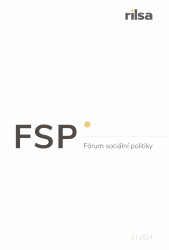Náhradní výživné jako nedostupná dávka? (Emoční) bariéry jejího čerpání z perspektivy mladých dospělých dětí
Compensatory child alimony as an unavailable benefit? (Emotional) barriers to its access from the perspective of young adults
Author(s): Eva M. Hejzlarová, Monika ChuráSubject(s): Public Administration, Family and social welfare, Welfare services, Social Norms / Social Control, Socio-Economic Research
Published by: Výzkumný ústav práce a sociálních věcí
Keywords: alimony;compensatory alimony;courts;young adults;emotions;special money
Summary/Abstract: The paper focuses on whether or not compensatory child alimony, which comprises a relatively new Czech social policy benefit, fulfils its function from the perspective of young adults, i.e. adult “dependent” children in the education system who are entitled to alimony but do not receive it (regularly). Theoretically, the study draws on the political sociology of emotions, the concept of special money introduced by Zelizer and the concept of invisible stakeholders, while empirically it draws on unique data from the Czech court system on the development of the number of related enforcement orders between 2018 and 2022 and on the analysis of seven semi-structured interviews. The study concludes that although legislation considers adult dependent children as full actors, their experiences of alimony and the perception thereof present barriers in terms of young adults applying for the benefit, as does their relationships with their loved ones. Although this benefit has helped many families, it is unlikely to be a major gamechanger for young adults.
Journal: Fórum sociální politiky
- Issue Year: 2024
- Issue No: 1
- Page Range: 58-75
- Page Count: 18
- Language: Czech

